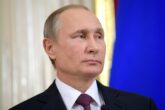September 12, 2019
Russia’s Middle East Power Play
Turkey flouted months of American warnings this summer and took delivery of the Russian-made S-400 air-defense system — triggering Ankara’s expulsion from the F-35 stealth-fighter program and obligating the imposition of additional sanctions by the Trump administration under U.S. law. Most immediately, these developments mark a new and precipitous deterioration in the long-unraveling U.S.–Turkish alliance. But Ankara’s decision to choose a Russian weapons system over a U.S. one also points to a wider and even more ominous geopolitical shift: the growing influence of the Kremlin as a strategic force across the greater Middle East, at America’s expense.
For close observers of the Middle East, Russia’s return as a great-power rival to Washington is as startling as it is disorienting. Leaders from once-stalwart U.S. allies such as Egypt and Saudi Arabia now shuttle regularly to Moscow for high-level consultations about regional developments, while Russian weapons deals and energy investments have proliferated from the Arabian Gulf to the Maghreb. In fractured states such as Lebanon and Iraq, the pursuit of closer ties with Russia has become a rare point of national consensus across sectarian fault lines: Iranian clients look to Moscow as a proven friend, while Tehran’s rivals woo the Kremlin as a potential counterweight to Persian hegemony.
Even Israel, America’s closest Middle Eastern partner, has come to embrace Moscow’s role as a regional power broker, hosting a first-of-its-kind summit of U.S. and Russian national-security advisers in Jerusalem in late June. While both the Trump administration and Israeli officials were quick to portray the gathering as an exercise in isolating Iran — testing the potential to separate the Kremlin from its erstwhile accomplice in Syria — the meeting sent another message to the region: about the acceptance of Russia by the Jewish state as a coequal to the U.S. in shaping the future of the Levant.
Read the full article in National Review.
More from CNAS
-
Trump ‘Humiliated’ as Putin Sends Clear Message That He Doesn’t Care About US
"Putin is not playing ball." Putin's Palm Sunday attack on Sumy is "embarrassing for the White House" as it comes just days after Steve Witkoff met with the Kremlin, says adju...
By Jim Townsend
-
The Hidden Past and Uncertain Future of the U.S. and Ukraine with Celeste Wallander
Under the Trump administration, U.S. support for Ukraine is no longer guaranteed. President Trump's pause on aid and intelligence to Ukraine in March may have been brief, but ...
By Andrea Kendall-Taylor, Jim Townsend & Celeste Wallander
-
Is Russia Under Pressure?
Since 2014, the United States and its allies have provided increasing military support to Ukraine while imposing more and tougher economic sanctions on Russia, especially sinc...
By Jeffrey Edmonds
-
Sharper: Russia and the Axis of Upheaval
Russia’s 2022 invasion of Ukraine served as a dramatic catalyst for strengthening the global axis of upheaval. To sustain its war effort, Russia has imported Iranian weapons a...
By Charles Horn




